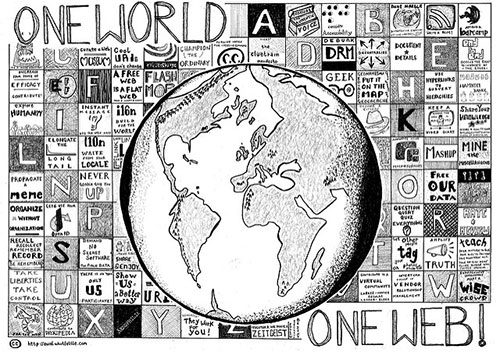Back in 2010, digital theorist and UC Berkeley lecturer Howard Rheingold wrote an article titled “Attention, and Other 21st-Century Social Media Literacies,” wherein he explains five online proficiencies he believes are crucial to a healthy and valuable existence in today’s digital world. According to Rheingold, mastering his five social media literacies is essential for establishing a “way of being” in digital culture, but what does the sum of those parts truly look like, what is it called, and what are its implications? Each literacy Rheingold illuminates in his article is undoubtedly crucial, from learning when and where to direct one’s mental energy with the foundational literacy of attention, to learning how to participate and collaborate in an effective and conscientious manner, to the unmentioned literacy of being able to build and create for oneself using skills like coding. However, in my mind, while all of these things add up to a comprehensive savviness of web usability, I still ask myself, “Is there one more step that needs to be taken?” That is the question I was left with after reading Rheingold’s article, and I believe the answer can be found in a term that promises a new era of digitally literate, socially conscious, and fiercely vigilant web users: digital patriotism.
There are many similar terms with the words “digital” or “internet” in them that precede this idea. There is “digital native,” which denotes an individual who has grown up in and is accustomed to their digital surroundings, but that is merely the starting point. Being “native” to any land is not a matter of choice; it is a matter of birthplace, and thus it does not necessitate any notion of agency or loyalty. At first, I thought the answer to this issue could possibly lie in the term “internet citizen,” as that is a logical next step from nativity (i.e., a native of any land is likely to become that land’s citizen). This is also a somewhat recognized term on today’s internet, though it mostly only shows up in interactive quizzes that purport being able to establish whether or not the taker is a “true” digital citizen. There are, however, more official sources that define the term as an established state of being—there are even nine official elements of digital citizenship. Nevertheless, this term still falls short of what is truly needed, as its official definition merely means “one who uses the internet regularly and effectively.” Even with all of Rheingold’s mastered literacies being used on a frequent basis, there remains the need for voluntary dedication that moves beyond an awareness of technological surroundings into a state of technological faithfulness.
“Patriotism” is defined as the “devoted love, support, and defense of one’s country.” Thus, a “patriot” is any individual who takes these qualities upon themselves and upholds them as personal duties for the sake of whatever citizenry of their choosing. While it may play a bit loosely with the word “country,” a digital patriot, then, is a digital native turned internet citizen who not only is an effective and frequent user of the internet, but one who considers it their personal responsibility to ensure the digital land they inhabit is shown devoted love and support and is defended at all costs. If I may offer my own personal definition, digital patriotism is the act of recognizing not just the full utility of the internet, but recognizing the full vulnerability of the internet and acting accordingly, all to maintain the internet’s integrity. That ever-present vulnerability can be exacerbated by everything from too much government oversight or interference to too little practice of digital ethics on the part of individual users.
One small step on the road to digital patriotism is assembling one’s own identity on the web in the most intentional and mindful way possible. The act of buying your own name on the internet—an act that is advocated by digital specialists with more and more urgency—may seem irrelevant to some, but there is no better way to begin the process of truly investing in one’s digital surroundings. Once you have taken ownership over a small piece of the internet—planted your flag, if you will—all neighboring communities start to look a bit more impactful, a bit more valuable, and eventually, the entire thing blends together into one cohesive whole. In the end, the transmittal of one’s identity to a digital landscape is an act of immigration, wherein you’ll find yourself learning a new language, seeing new sights, relishing new experiences, and hopefully, pledging your precious allegiance to a newfound and beloved second home.

